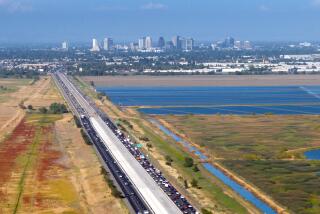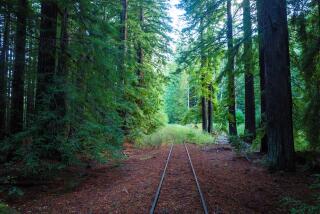New road dead-ends in an Alaska free-for-all : Environmentalists and others oppose building the highway to an isolated town on Prince William Sound.
- Share via
CORDOVA, Alaska — The only way to get to this picturesque town is a six-hour ferry ride or a plane trip into the Merle K. (Mudhole) Smith Airport.
Many of the 2,600 residents like it that way, enjoying their isolation on the edge of Prince William Sound, beneath the shadow of steep, spruce-covered hills and separated from the North American road system by forests, rivers, glaciers and a wall of mile-high, snow-covered mountains.
But then there are those who favor a road, and none favor it more than Alaska’s combative governor, Walter J. Hickel. A former U.S. secretary of the Interior and a longtime real estate developer elected as an independent last year, Hickel has made building a road to Cordova one of his top priorities.
Last summer, with no notice and with Hickel’s blessing, state highway crews begin carving out a gravel road along an 82-mile, long-abandoned railroad bed between Cordova and the nearest settlement, Chitina. In the rush to get the work done, debris was dumped into the salmon-rich Copper River and its tributaries.
In the months since, the Cordova road has turned into a typical Alaska environmental free-for-all, slugged out in letters-to-the-editor columns, in courtrooms and coffee shops.
The federal government is threatening to take the state to court for failing to stop the road work and for allegedly violating the Clean Water Act. The Ahtna Indians sued, claiming bulldozers were plowing near ancient burial grounds. Recently, a special prosecutor was appointed to investigate whether criminal charges should be filed against highway workers for damaging fish habitat. Legislators are up in arms because Hickel never got their approval.
And environmental groups, long at odds with Hickel over his pro-development agenda, see the Cordova highway as the last straw.
“He thinks he can just overlook the laws and proceed with his own objectives, no matter what,” said Jack Hession of the Sierra Club’s Anchorage office. The group’s Alaska chapter has joined a fledgling Hickel recall campaign.
The 72-year-old Hickel remains undeterred. He recently announced that he is studying using National Guard troops to resume the Cordova road work next spring, once the snow melts, and plans to ask legislators for some $17 million to finish the gravel road. The state eventually hopes to get up to $85 million in federal highway funds to build a full-blown highway.
Hickel and other state officials dispute that there have been improprieties in the Cordova project and deny that any environmental laws have been knowingly violated.
In a recent interview, Hickel argued that most Alaskans support the project, and he criticized environmental groups as elitist and short-sighted. “What have they ever done for the people I’m trying to help--the people who are unemployed? I don’t know what they’ve ever done to create jobs,” Hickel said.
The road controversy is something that just never comes up in most of America. Almost every place is on a highway. But not here. Alaska has fewer state highways than Vermont, and most of the state’s 200-plus towns and villages, including the state capital of Juneau, are nowhere near the road system.
In Cordova, bald eagles circle overhead downtown and sea otters bob in the inlet, near a harbor filled with $500,000 fishing boats. Most of the streets are gravel, many of the houses weathered clapboard. Reports in the weekly newspaper of grizzlies and black bears wandering into town are more common than robberies or assaults.
The town lives on commercial fishing, especially salmon, and lately that hasn’t been much of a living at all, with the big cannery here shutting down in the face of plunging prices.
One argument against the road is that it would further hurt fishing, partly by luring tourists here and creating a big new sport salmon fishery, cutting into the commercial fishermen’s take.
Another argument is that Cordova should remain a quiet part of the world. Critics question the benefits of a road to Chitina, a tiny crossroads still a six-hour drive from Anchorage, the state’s business center. Instead of a road, they want to expand the twice-a-week ferry to Valdez.
“A lot of people, including me, came here because of the way Cordova is. They don’t want it to turn into something else,” said Ollie Osborne, one of two doctors in town. He moved here several years ago from Northern California, he said, partly because of the friendly, laid-back pace.
Still, many people in Cordova see the road as progress, and commend Hickel for forging ahead.
“I admit it, there are some advantages to isolation,” said Scott Novak, a fuel dealer who has lived here for two decades. “I’ve seen so many people around here, they move here for a few years, they don’t want a road. But then after a while, they lose their job or they realize they’re not getting where they want to be in life. They can’t afford to be here any more. You know what they do? They move somewhere with a road.”
More to Read
Sign up for Essential California
The most important California stories and recommendations in your inbox every morning.
You may occasionally receive promotional content from the Los Angeles Times.










